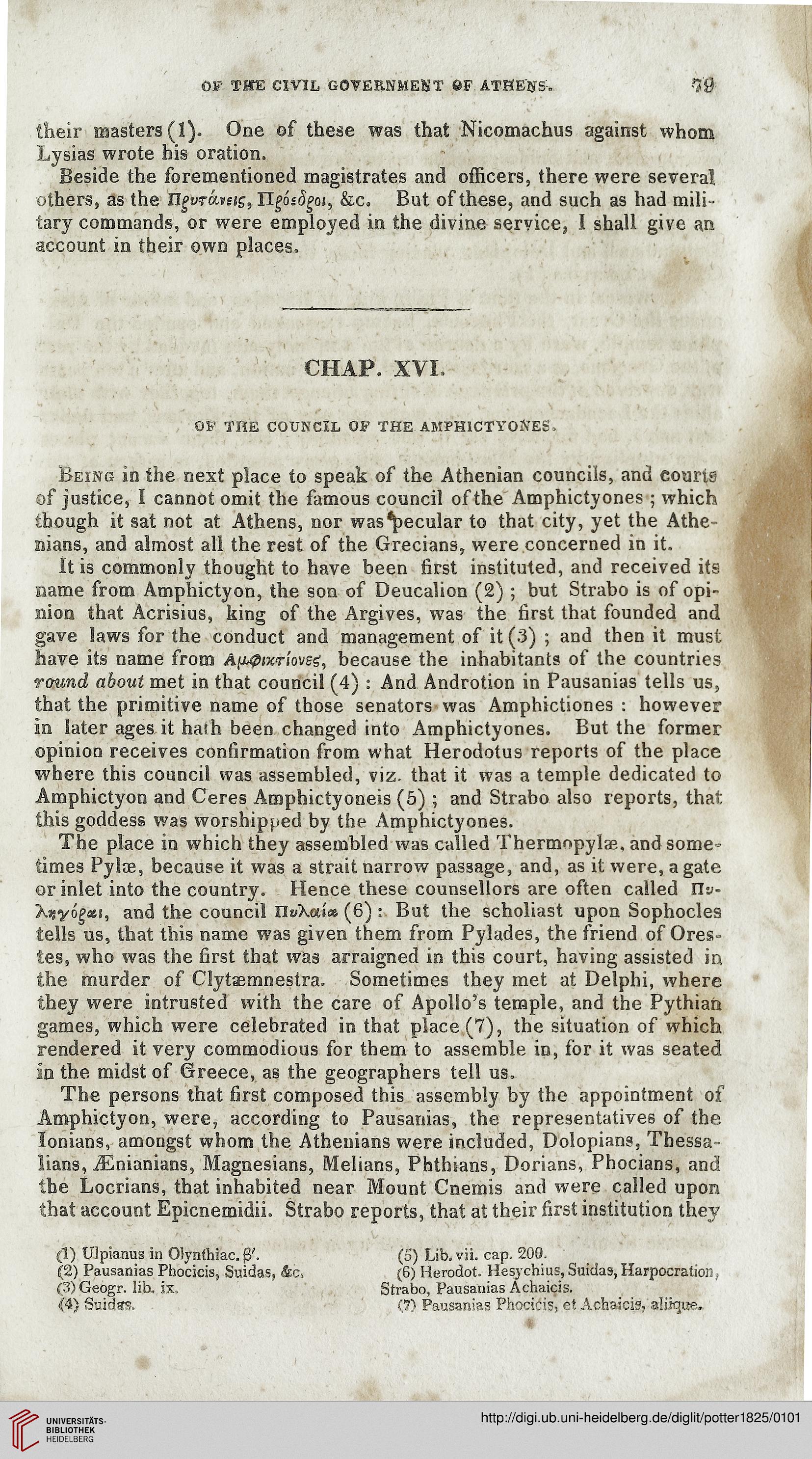of the civil government ©f athens.
78
their masters (1). One of these was that Nicomachus against whom
Lysias wrote his oration.
Beside the forementioned magistrates and officers, there were several
others, as the Ilgvraveig, UgosSgoi, &c. But of these, and such as had mili-
tary commands, or were employed in the divine service, I shall give an
account in their own places,
CHAP. XVI.
of the council of the amphictyones.
Being in the next place to speak of the Athenian councils, and courts
of justice, I cannot omit the famous council of the Amphictyones ; which
though it sat not at Athens, nor was*pecular to that city, yet the Athe-
nians, and almost all the rest of the Grecians, were concerned in it.
It is commonly thought to have been first instituted, and received its
name from Amphictyon, the son of Deucalion (2) ; but Strabo is of opi-
nion that Acrisius, king of the Argives, was the first that founded and
gave laws for the conduct and management of it (3) ; and then it must
have its name from AiupKriovez, because the inhabitants of the countries
round about met in that council (4) : And Androtion in Pausanias tells us,
that the primitive name of those senators was Amphictiones : however
in later ages it haih been changed into Amphictyones. But the former
opinion receives confirmation from what Herodotus reports of the place
where this council was assembled, viz. that it was a temple dedicated to
Amphictyon and Ceres Amphictyoneis (5) ; and Strabo also reports, that
this goddess was worshipped by the Amphictyones.
The place in which they assembled was called Thermopylae, and some-
times Pylae, because it was a strait narrow passage, and, as it were, agate
or inlet into the country. Hence these counsellors are often called llv-
Xr.yogxi, and the council Tlvkaix (6) : But the scholiast upon Sophocles
tells us, that this name was given them from Pylades, the friend of Ores-
tes, who was the first that was arraigned in this court, having assisted in
the murder of Clytaemnestra. Sometimes they met at Delphi, where
they were intrusted with the care of Apollo's temple, and the Pythian
games, which were celebrated in that place (7), the situation of which
rendered it very commodious for them to assemble in, for it was seated
in the midst of Greece, as the geographers tell us.
The persons that first composed this assembly by the appointment of
Amphictyon, were, according to Pausanias, the representatives of the
lonians, amongst whom the Athenians were included, Dolopians, Thessa
lians, JEnianians, Magnesians, Melians, Phthians, Dorians, Phocians, and
the Locrians, that inhabited near Mount Cnemis and were called upon
that account Epicnemidii. Strabo reports, that at their first institution they
(1) Wpianus in Olynthiac. f3'.
(2) Pausanias Phocicis, Suidas, <Sec>
(3) Geogr. lib. ix,
<4) Suidas.
(5) Lib. vii. cap. 200.
(6) Herodot. Hesychius, Suidas, Harpocration,
Strabo, Pausanias Achaicis.
(7) Pausanias Phocids, et Achaicis, aliique,
41
78
their masters (1). One of these was that Nicomachus against whom
Lysias wrote his oration.
Beside the forementioned magistrates and officers, there were several
others, as the Ilgvraveig, UgosSgoi, &c. But of these, and such as had mili-
tary commands, or were employed in the divine service, I shall give an
account in their own places,
CHAP. XVI.
of the council of the amphictyones.
Being in the next place to speak of the Athenian councils, and courts
of justice, I cannot omit the famous council of the Amphictyones ; which
though it sat not at Athens, nor was*pecular to that city, yet the Athe-
nians, and almost all the rest of the Grecians, were concerned in it.
It is commonly thought to have been first instituted, and received its
name from Amphictyon, the son of Deucalion (2) ; but Strabo is of opi-
nion that Acrisius, king of the Argives, was the first that founded and
gave laws for the conduct and management of it (3) ; and then it must
have its name from AiupKriovez, because the inhabitants of the countries
round about met in that council (4) : And Androtion in Pausanias tells us,
that the primitive name of those senators was Amphictiones : however
in later ages it haih been changed into Amphictyones. But the former
opinion receives confirmation from what Herodotus reports of the place
where this council was assembled, viz. that it was a temple dedicated to
Amphictyon and Ceres Amphictyoneis (5) ; and Strabo also reports, that
this goddess was worshipped by the Amphictyones.
The place in which they assembled was called Thermopylae, and some-
times Pylae, because it was a strait narrow passage, and, as it were, agate
or inlet into the country. Hence these counsellors are often called llv-
Xr.yogxi, and the council Tlvkaix (6) : But the scholiast upon Sophocles
tells us, that this name was given them from Pylades, the friend of Ores-
tes, who was the first that was arraigned in this court, having assisted in
the murder of Clytaemnestra. Sometimes they met at Delphi, where
they were intrusted with the care of Apollo's temple, and the Pythian
games, which were celebrated in that place (7), the situation of which
rendered it very commodious for them to assemble in, for it was seated
in the midst of Greece, as the geographers tell us.
The persons that first composed this assembly by the appointment of
Amphictyon, were, according to Pausanias, the representatives of the
lonians, amongst whom the Athenians were included, Dolopians, Thessa
lians, JEnianians, Magnesians, Melians, Phthians, Dorians, Phocians, and
the Locrians, that inhabited near Mount Cnemis and were called upon
that account Epicnemidii. Strabo reports, that at their first institution they
(1) Wpianus in Olynthiac. f3'.
(2) Pausanias Phocicis, Suidas, <Sec>
(3) Geogr. lib. ix,
<4) Suidas.
(5) Lib. vii. cap. 200.
(6) Herodot. Hesychius, Suidas, Harpocration,
Strabo, Pausanias Achaicis.
(7) Pausanias Phocids, et Achaicis, aliique,
41




